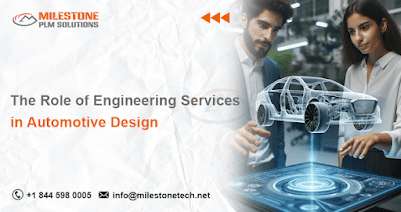The Role of Engineering Services in Automotive Design
The automotive industry is undergoing a period of unprecedented transformation. Electric vehicles, autonomous driving technologies, and advanced features are rapidly changing the landscape. In this dynamic environment, the role of automotive design and engineering services becomes even more critical in shaping the future of mobility.
While the visual appeal of a car undoubtedly plays a significant role, successful automotive design goes far beyond aesthetics. It encompasses a complex interplay of functionality, safety, performance, and user experience. This is where engineering services come into play, acting as the bridge between the initial design vision and the creation of a real-world product.
What are Engineering Services in Automotive Design?
Engineering services encompass a wide range of specialized skills and expertise that are crucial for bringing an automotive design to life. These services can be broadly categorized into the following areas:
- Concept Design and Development: Engineering service providers work closely with designers to translate initial sketches and concepts into feasible technical solutions. This involves analyzing the feasibility of design elements, ensuring compliance with safety regulations, and suggesting alternative materials or manufacturing processes.
- Computer-Aided Engineering (CAE): Advanced CAE tools are utilized to perform virtual simulations, analyzing the performance, durability, and safety of a vehicle design in various conditions. This allows engineers to optimize the design and identify potential issues before physical prototypes are built.
- Powertrain Engineering: This specialized field focuses on the design and development of the vehicle's power source, whether it's a traditional combustion engine, an electric motor, or a hybrid system. Powertrain engineers ensure that the power source meets performance, efficiency, and emissions standards.
- Body-In-White (BIW) Engineering: BIW engineering deals with the design and development of the vehicle's core structure, which is typically made of steel or aluminum. This involves optimizing the structure for strength, weight reduction, and crashworthiness.
- Systems Engineering: The integration of various electrical, mechanical, and software systems within a vehicle is a complex task. Systems engineers ensure seamless communication and collaboration between different teams working on these individual systems, guaranteeing their smooth operation and overall functionality.
The Benefits of Utilizing Engineering Services:
Partnering with a reliable engineering services provider offers numerous benefits for automotive manufacturers and designers:
- Enhanced Design Efficiency: By identifying potential issues early in the design phase, engineering services can help streamline the design process and avoid costly delays or redesigns later.
- Improved Safety and Performance: Advanced engineering tools and expertise ensure that the final product adheres to the highest safety standards and delivers optimal performance in terms of power, efficiency, and handling.
- Faster Time-to-Market: Utilizing readily available engineering expertise can significantly accelerate the development process, allowing manufacturers to bring new vehicles to market faster, gaining a competitive edge.
- Cost Optimization: Engineering services can help identify cost-saving opportunities through material selection, manufacturing process recommendations, and design optimization.
The Future of Engineering Services in Automotive Design:
As the automotive industry continues to evolve, the role of engineering services will become even more critical. Here are some key trends to watch:
- Increased Focus on Electrification and Autonomous Driving: Engineering services will play a vital role in developing and integrating complex electric powertrains and autonomous driving technologies into vehicles.
- Integration of Artificial Intelligence (AI) and Big Data: AI and big data analytics will be increasingly used to optimize designs, predict potential issues, and personalize the driving experience.
- Collaboration and Open Innovation: Open collaboration between engineering service providers, automotive manufacturers, and technology startups will be crucial for fostering innovation and accelerating progress in the industry.
Conclusion:
In conclusion, engineering services are an indispensable force shaping the future of automotive design. By providing specialized expertise, advanced tools, and a collaborative approach, engineering services play a vital role in translating innovative concepts into safe, efficient, and high-performing vehicles that meet the ever-evolving demands of the automotive landscape.




Comments
Post a Comment